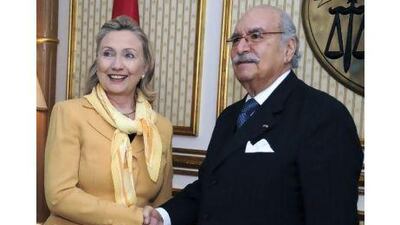TUNIS // The US secretary of state, Hillary Clinton, stepped into the cradle of Arab revolution yesterday, meeting Fouad Embazza, Tunisia's interim president, and other leaders to pledge support for democratic reform even as anti-US protest simmered in downtown Tunis, the capital.
"The revolution created so many hopes and now we have to translate those hopes into results and that comes through economic reform and political reform," Mrs Clinton said yesterday while touring Red Crescent offices in Tunis, Agence France-Presse reported.
Such reforms, however, when coupled with burgeoning Tunisian nationalism, present the United States with a tricky balancing act: supporting democratic transition without appearing to meddle in it.
John Entelis, the director of the Middle East Studies programme at New York's Fordham University, said: "Whether they can maintain that balancing act as things go forward is a big question. There is opposition to Clinton's visit, as you'd expect in an increasingly democratic society."
Hundreds of demonstrators had gathered in the main promenade of central Tunis for the past three days to protest against Mrs Clinton's visit, which they have described as US interference in Tunisia's home-grown revolution, which ousted the president, Zine el Abidine Ben Ali, in January. The government has promised elections in July to select a commission to draft a new constitution; for now, restrictions on free speech and political life have already been lifted.
Tunisia is Mrs Clinton's third and final stop on a tour this week to voice US support for North African revolts that have inspired similar calls for democratic reform across the Arab world.
On Wednesday, Mrs Clinton met Egyptian leaders and toured Cairo's Tahrir Square, the scene of weeks-long protests last month that toppled the former president Hosni Mubarak, who ruled Egypt for three decades.
"To see where this revolution happened and all that it has meant to the world is extraordinary for me," Mrs Clinton told reporters as she walked through the square.
Protests began in Tunisia in December after a Tunisian vegetable-seller named, Mohamed Bouazizi, set fire to himself after years of harassment by local authorities.
Those protests spiralled into calls for the departure of Mr Ben Ali, who abruptly fled the country in January after 23 years in power.
Within weeks of his ouster, Tunisian publishing houses issued titles such as The Revolution of the Brave, available in Tunis bookshops. Graffiti and political posters have rebranded a roundabout in central Tunis to commemorate the revolution; a film biopic of Bouazizi is in the works.
Such pride sometimes translates into mixed feelings towards the United States, viewed by many Arabs as a democratic model at home whose foreign policy interests have often run counter to democratic aspirations abroad.
"I'd like exchange of people and culture, but nothing at the political level," said Azyz Amamy, 28, a pro-democracy blogger detained for his writing during the final weeks of Mr Ben Ali's rule. Mr Amamy has long harboured scepticism of US foreign policy, which deepened with the televised spectacle of US soldiers marching through Baghdad after the invasion of Iraq in 2003. "I'll never erase that image from my mind."
However, Mr Amamy will also never forget Mark Zuckerberg, the creator of Facebook, an online tool that proved instrumental in powering Tunisia's revolution by allowing activists to get around state controls on media.
Mr Amamy wants to see more US investment and people to people exchanges, and aspires to launch a Tunisian edition of MAD Magazine, a satirical cartoon-based periodical headquartered in New York.
For her part, Mrs Clinton said the US would offer several hundred million dollars in economic aid to help Tunisia create badly needed jobs, and pledged yesterday to send delegates to an international donors conference expected in the coming months.
"We want to know what Tunisia wants. We don't want to come in and say here's what the United States believes," she said, according to Agence France-Presse.
Mr Entelis said enhancing economic and cultural exchange is an opportunity for the US "to demonstrate that not all foreign relations - especially in the Middle East and North Africa - have to be about security."

